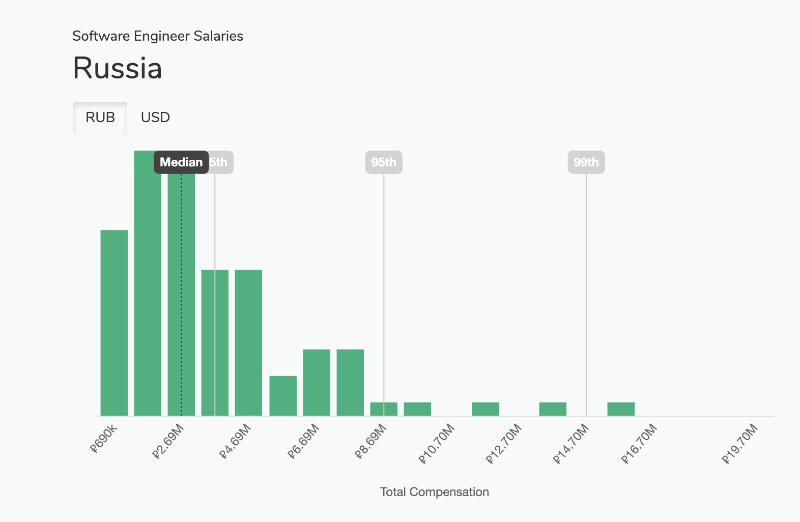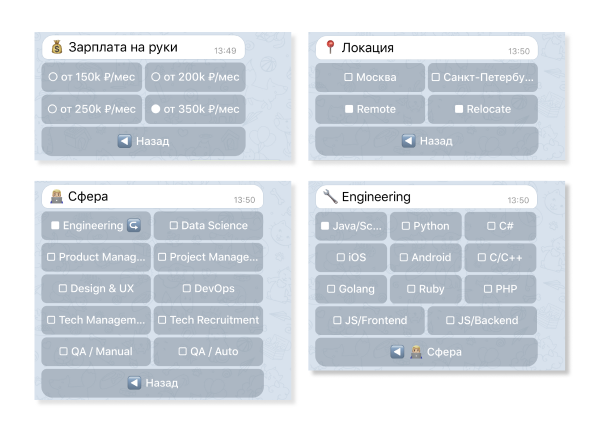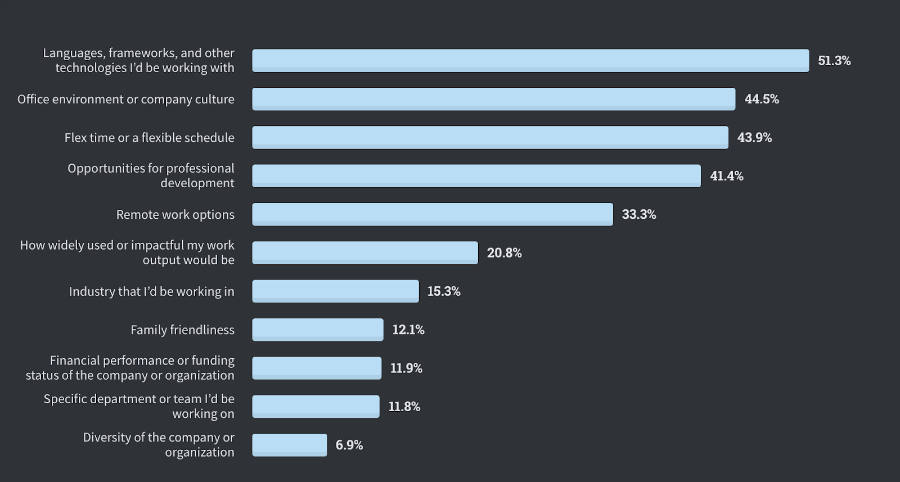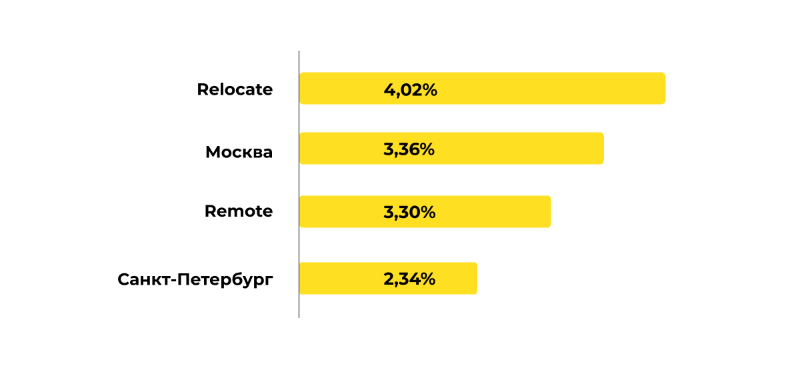
Despite the fact that 2020 turns out to be quite unusual, one thing remains unchanged - the huge demand for developers in the labor market. Even during a pandemic, and even more so after the gradual winding down of the global quarantine, companies are ready to hire strong engineers, offer them interesting projects and good conditions.
All this means that a talented developer who is not even actively looking for a new job will still receive interesting offers. In today's article we will talk about how to approach the discussion of the conditions of future work, what exactly to look at in the offer, and at what point to start asking the most important questions.
Stage # 1: find out our worth and decide on our wishes
For a new job to bring satisfaction on all fronts - from ambition to salary - you need to do some preliminary preparation. First of all, it is necessary to clearly define the salary for a developer with similar experience in the region where the company offering the vacancy is located.
This approach is suitable for vacancies at home or with relocation, in the case of remote work for a foreign company, there are some nuances. In general, analytical materials help to solve this problem. Data on the salaries of Russian IT specialists can be found on resources like Levels. For example, according to this service, most of the salaries of developers in our country are in the range between 1.69 - 3.69 million rubles per year (140.8 - 307.5k per month)

If you are thinking about moving to another country, then it is worth studying the most recent salary reports in the desired region. Of course, you should pay attention to the research of portals like StackOverflow, where you can get data for the United States and some other countries.
For example, the research for 2020 collected data on the most "profitable" technologies, as well as a correlation between salary and experience in a particular specialty:

You can also use our bot @ g_jobbot to analyze a possible salary... After you have entered information about your experience in it, it will begin to send jobs suitable for you directly in Telegram. Accordingly, by the number of vacancies, you can understand how relevant your market queries are. Perhaps your salary is already out of date - this was the case with the hero of one of our articles. The engineer earned 60% less than he could, and only found out about it using a bot.

Another important stage of preparation is to decide on interesting technologies and career trajectory. Do you want to grow vertically or horizontally? Develop knowledge within the current stack or try to change it? All these are important questions, the answers to which will seriously affect the evaluation of future offers.
For comparison, here's how developers surveyed by StackOverflow ranked the various factors in terms of their influence on job choice:

Stage 2: collecting information about the company
After you have struck up a conversation with a specific company, it is worth collecting as much data as possible about it. During interviews, it is worth clarifying the following questions:
- what product / project will you work on
- what technologies and methodologies are used now
- how is the code review process going, is there any
- are there any plans to change the stack in the future
- how big is the team, who is it
- who is the leader
It is clear that if the company works on the waterfall methodology, and you are an ardent adherent of scrum, or there are no clear code standards in the team, collaboration may not be the best solution.
Another important point that can help prepare for the next step in discussing the offer is to try to find out how much the company usually pays. It's not so easy to do this, but there is no rocket science here either. You just need to find someone on LinkedIn or among your acquaintances who already works there or has recently worked in a similar position.
Of course, you shouldn't ask head-on "how much did you get paid?" This is incorrect and can put the other person in an awkward situation. It's much better to ask, “Do you think this kind of fork is like what they pay with this skill set? And if not, which sounds more realistic? " It will be possible to build on the received figure at the next stage.
Stage 3: negotiations
First of all, it is worth deciding for yourself when exactly you are ready to start discussing working conditions. Despite the fact that you may be asked the desired salary at the initial stage, recruiters often recommend expressing the bulk of their wishes and requirements after receiving the offer - the fact that they have already decided to hire you will allow you to get better conditions.

G-mate statistics on hiring locations: today candidates in all categories of IT specializations are most interested in options with relocation
It is important not to rush to extremes here - if you had to spend some time looking for a job, then it will be great temptation to immediately agree to an offer that basically meets the wishes of paragraph 1. But you should not do this - it is better to spend some more time on negotiate conditions and get a chance to improve them. But, of course, you don't need to demand the impossible, after all, an offer is just an offer - you can withdraw it.
So, here are the aspects of future work worth paying attention to during the discussions:
What onboarding will look like and is there any
Moving to a new place is always stressful. The fact that most of the vacancies are now removed does not make the pull-in process any easier. If the company has some kind of onboarding process for one or several weeks, it will help to get in the know more easily and start producing results. This point is definitely worth discussing at the start.
What is the approach to work-life balance
Companies are different - there are small startups where people are paid good salaries, given options, but you need to work 60 hours a week with frequent rush jobs. This allows you to grow quickly, but work will take up most of your life.
On the contrary, there are also quieter medium and large companies, where they pay well, there are interesting projects, but in fact the work is half as much. To some it may seem boring, but to someone it is very important to have some kind of life outside of work.
What's with the prizes
Some companies have a well-documented bonus policy based on an employee's performance, project, or the entire organization. Here you can discuss the size of such a bonus, KPI for getting it, etc.
What financial motivation besides salary does the company have?
Some companies pay for health insurance (including for family members), someone provides additional paid leave. Does the company have options or the ability to get shares if it is already listed on the exchange? All these are important points that translate into an employee, in fact, additional income.
What other bonuses does the company provide?
There is a lot of room for discussion here - payment for mobile communications, fitness subscription, corporate phone and laptop, payment for training and professional conferences.
:
- [ ] Amazon vs Microsoft: -
- 2020 : , +
- Netflix 45 : system design-, +
- : 10